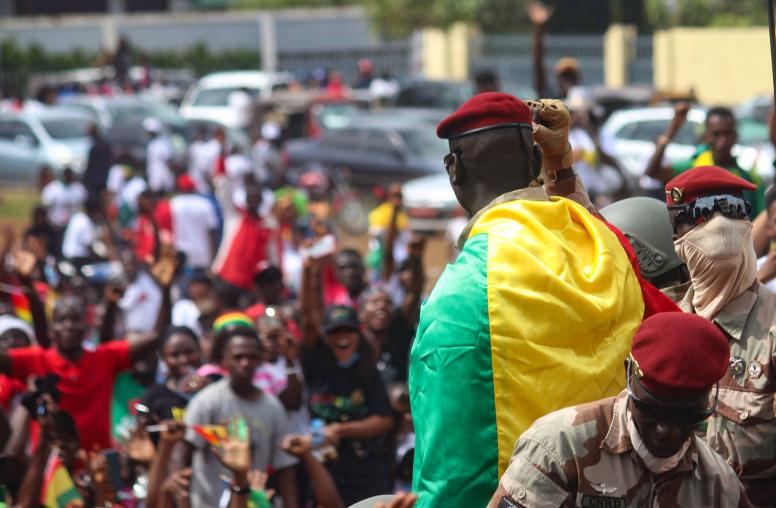In a Divided U.S., One Event Proved There's Still Bipartisan Foreign Policy
Amid the public debate about America's divisions, it may have been easy to miss this image just days before the inauguration: the national security advisers of Presidents Obama and Trump standing side by side to vow bipartisan cooperation in the transition of authority.

The advisers — Obama's ambassador to the U.N., Susan Rice, and retired Lt. Gen. Michael Flynn, Trump's national security adviser — went beyond simple cordiality. Over two days, they met national security, diplomatic and international development leaders from across the political spectrum to explore common ground for the shaping of America's foreign and security policies.
America's recent political acrimony has been profound, but this gathering — "men and women who have, between them, witnessed every crisis to buffet American national security for 40 years," noted The Economist — transcended it. The conference, called "Passing the Baton," is convened by the U.S. Institute of Peace at presidential transitions.
It showed that, even now, dialogue can build the bipartisan foundations of effective policies so vital for national security.
As the Trump administration and a new Congress take on America's security and foreign policy challenges, here are areas of broad agreement that emerged at Passing the Baton:
1. U.S. leadership is indispensable and will require allies.
Even more than most elections, last year's contest spurred talk of an isolationist America inclined to turn inward, away from many of its international engagements and allies. But oceans long ago ceased to buffer us against turmoil abroad and every administration ends up having to respond to global crises and the threats they raise for America.
"We have to ... take on a much greater leadership role" that "whether we like it or not, the world demands," Flynn told us. The new administration will review U.S. "relationships around the globe," he said.
But he joined Rice and others from both parties in urging that the United States continue to work with our partners. "In fact, alliances are one of the great tools that we have, and the strength of those alliances magnify our own strengths," Flynn said.
2. America's engagement abroad will include "strengthening its platform" at home.
Democrats and Republicans agreed that the United States needs to reinforce internal foundations from which it exercises its role abroad. This means "strengthening our economy, getting our politics to work, [and] restoring our military" following years of exhausting deployments and budget sequestration, said former National Security Adviser Stephen Hadley, who served under President George W. Bush.
3. Getting ahead of crises abroad means addressing their root causes.
Across the political spectrum, policymakers and experts declared it urgent that the United States lead in an international partnership to focus on fragile states. These countries, governed ineffectively and often repressively, are generating the civil wars, extremism, refugees, pandemics and other crises that have roiled Europe and that threaten American security, noted retired Gen. Jack Keane.
Sen. Lindsey Graham (R-S.C.) renewed his idea for an international public-private partnership — a "new Marshall Plan" — to offer greater development and investment to those states willing to enact tough reforms.
Graham and others noted that it is far cheaper to prevent crises in fragile states than to firefight wars and refugee emergencies after violence breaks out. The U.S. Institute of Peace recently helped formulate strategic recommendations on that prevention work for the new Congress and administration.
4. U.S. policy must use all available tools and must strengthen those critical to building sustainable peace abroad.
Sens. Graham and Tom Cotton (R-Ark.); former Secretary of State Madeleine Albright, who served under President Clinton; and others, military and civilian, all underscored America's need for strong tools of diplomacy, development and reconciliation.
Many focused on what federal budgeters call "the 150 account," which covers all international activities except national defense. This spending "is 1 percent of the budget" and "is a great tool in the war on terror," said Graham. If setting a budget to improve America's "defense doesn't mean the 150 account, you made a huge mistake," he said.
Development work in strategic areas is "incredibly inexpensive compared to ... military systems," said retired Adm. James Stavridis. "These are really penny-on-the-dollar investments."
5. American policy will need a bipartisan response to attacks on the rules-based international regime.
Leaders from across America's political spectrum voiced concern at aggression by Russia; military assertiveness by China; a weakening in Europe's cohesion; and the outsized influence that small groups or individuals can wield through advanced technology and weapons. These signal an erosion in the international system that has managed conflicts and advanced shared values, effectively if imperfectly, for seven decades.
"The world won't get more orderly without U.S. leadership," noted Frederick Kempe of the Atlantic Council.
6. Successful foreign policies require long-term consistency — perhaps for a decade or a generation.
Only sustained, consistent policies can solve or prevent crises, and this underscores the need for a bipartisan core to those policies. As Albright noted, the world's challenges don't present themselves in four- or eight-year segments.
Last year's peace deal to end Colombia's civil war was facilitated by a U.S. policy of economic development, security assistance and support for peace negotiations sustained by three administrations over more than 16 years.
Not all the talk at the conference was harmonious. But Americans from all sides showed their commitment to cultivating common ground on our relationship with the world.
For decades, American leaders have agreed that a bipartisan basis for our foreign policy is essential. Those who gathered at the recent Passing the Baton conference showed that it remains possible.
Originally published in The Hill. Republished with permission.



